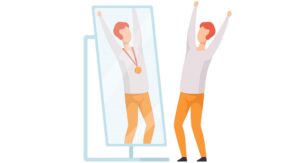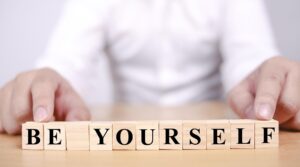What is self-confidence?
What is self-confidence? : Have you ever wondered what makes some people shine confidently while others struggle to emerge from their shadows? Self-confidence is the flame that burns within every human being, and it can change the course of your life and be the key to achieving unparalleled success and opportunities. Imagine attending business meetings more confidently, communicating efficiently with your friends, and answering questions in job interviews with complete calm. This ability will allow you to overcome challenges and add vitality and color to your life.
But what is self-confidence, and how can you strengthen it? Is this characteristic innate, or can it be learned? In this fascinating journey, we will explore the world of self-confidence and discover its secrets. Join us to discover how we can identify and strengthen this fantastic force within ourselves and add more glory and beauty to our lives.
Definition of Self-Confidence
Self-confidence means believing in one’s abilities and skills. This psychological characteristic includes feeling confident in one’s abilities to face various challenges and issues in life. In other words, self-confidence affects a person’s ability to evaluate situations, make informed decisions, and take action. Do not confuse self-confidence with ego. Overdoing it with self-confidence can be considered ego or self-importance, which is not a good trait.
Self-confidence includes two main dimensions:
Self-awareness: Self-confident People understand their characteristics, strengths, and weaknesses well. They know where their skills can benefit them and where to improve.
Performance: Self-confidence helps a person perform well in different situations. People with this trait are usually more creative, responsible, and ready to face challenges.
Importance of Self-Confidence
Improvement: People with more self-confidence perform better in completing tasks and facing challenges.
Social Relationships: Confident people are usually more successful in communicating with others and establishing better relationships. The type of social relationships and encounters can significantly impact self-confidence. Social support, encouragement, and praise from family and friends can strengthen self-confidence.
Stress Management: Self-confidence helps reduce stress and anxiety levels because people believe in their abilities and can better face challenging situations.
Goal Achievement: People with self-confidence are likelier to pursue and work hard to achieve their goals.
Factors affecting self-confidence
Past experiences
A person’s past successes and failures can significantly impact their self-confidence. Positive experiences can help increase self-confidence, while failures may decrease it.
Social support
Support from family, friends, and colleagues can help strengthen self-belief.
Self-awareness
Understanding your strengths and weaknesses and working to improve them is essential in increasing self-confidence.
Family upbringing
Parents’ parenting methods, how they treat their children, and the amount of attention and support they give them in childhood can profoundly impact the formation of self-confidence in adulthood. Parents and the way they raise them have a significant impact on the formation of self-confidence in children. Encouragement, affection, and support can strengthen a person’s self-confidence.
Role Models
Modeling yourself as a role model for others with high self-confidence or those who have succeeded in certain areas can motivate others and boost your self-confidence.
Culture
The cultural values and norms that prevail in a society can influence a person’s self-confidence. For example, cultures that value individuality and independence may help boost self-confidence.
Genetic Factors
Genetic factors may influence some personality traits that affect self-confidence.
Comparison with Others
Constantly comparing yourself to others and feeling inadequate in this comparison can lower self-confidence. Conversely, focusing on your integrity and uniqueness can help.
Influence of Media
Social media and the media can negatively impact self-confidence because they may compare people to unrealistic standards. Being aware of this and reducing your dependence on such media can be helpful.

The role of self-confidence in various aspects of life
Professional life
People with high self-confidence are usually less aggressive in the workplace and take advantage of opportunities more. Therefore, they are more likely to ask for promotions or new responsibilities and are more successful. It is interesting to know that the highest level of professional behavior is a charismatic personality, and to become such a person, you must have high self-confidence.
Education
Students and college students with more self-confidence participate more actively in classes and group activities and get better grades. Individual academic levels are of great importance.
Emotional relationships
People with more self-confidence are better able to interact and establish healthy relationships with others. They can express their needs well and set boundaries if necessary.
Ways to increase self-confidence
Improving self-confidence is a gradual process that requires continuous effort and practice and is not achieved overnight.
Setting small goals
Setting and achieving small goals can boost your sense of accomplishment and self-confidence. Set your goals gradually, making them small and achievable. Your sense of accomplishment and self-confidence will increase as you achieve small goals.
Practice positive thinking
Talking positively about yourself and believing in your abilities can help. Instead of criticizing yourself, say positive things about yourself. Using affirmations can help boost your sense of self-confidence.
Learn new skills
Expanding your skills will give you a sense of control and confidence. Gaining new knowledge and skills will not only make you feel empowered but also make you more prepared to face new situations.
Take care of yourself.
Your physical and mental health has a direct impact on your self-confidence. Improve your psychological and physical well-being by getting enough sleep, eating healthy, and engaging in recreational activities.
Non-blaming
Humans are fallible. Accepting this allows us to learn from our mistakes and use them to improve instead of blaming and fearing them. After each experience, analyze and review it. Learning from your successes and errors can help you do better in the future.
Importance of Appearance
Our clothing and how we appear in public also affect our self-confidence.
Recording Successes
Noting down and celebrating your successes can remind you of your strengths and abilities.
Developing Self-Awareness
Self-awareness involves recognizing your feelings, thoughts, and behaviors. Practicing meditation can help with this process. First, assess your strengths and weaknesses. Writing down your positive traits and accomplishments can help you get to know yourself better and focus on your strengths.
Facing Fears
Identifying and confronting your fears can help build self-confidence. Gradually putting yourself in scary situations and facing them can increase your sense of empowerment and confidence. Face your challenges and step outside your comfort zone. This can help you overcome your fears and improve your self-confidence.

Exercise and Physical Activity
Physical activity can help improve your overall mood and sense of empowerment. Regular exercise plays an essential role in reducing stress and increasing self-confidence. It can also help you feel better about your body and your abilities.
Counseling and Using Professionals
In cases where feelings of self-doubt are severe or chronic, consulting a psychologist or professional counselor can be helpful. Connect with positive and supportive people. Social support can make you feel more valuable and confident.
New Experience
Allow yourself to try new things. This can give you valuable experience and boost your belief in your abilities. By following these strategies and continuing to practice them, you can gradually build your confidence and get closer to your goals.
Examples of Understanding Self-Confidence in Different Situations
Example in Sports
Imagine that you are an athlete participating in a competitive race. If you are confident in your skills, you will be able to act calmly and focus during the race. For example, a confident runner will walk to the starting line and continue to work even if his competitors are strong instead of getting anxious.
Example in Relationships
Self-confidence helps you express your opinions and feelings easily in a romantic or friendly relationship. For example, if you need to talk to your partner about a certain issue, you will discuss it confidently instead of hiding your emotions, which will help strengthen your relationship. In fact, self-confidence is considered crucial human capital in establishing relationships.
For example, in the workplace
Suppose you are in charge of an essential project in an organization or company where you work. With confidence, you will know how to manage this project correctly and be able to share your strong ideas and opinions with others in meetings. This can help you advance in your career and increase your credibility in the eyes of others.
Example in learning
If you are learning a new language, having confidence will allow you to participate in conversations with native speakers and not be afraid of your mistakes. For example, your accent or grammar may not be perfect initially, but you will move forward confidently and gain experience.
Example in art
An artist (for example, a musician) who is confident in their abilities can appear in live performances with more energy and enthusiasm. This confidence can help them connect more with the audience and perform better.
Example in education
Suppose you are preparing for a major entrance exam. If you trust yourself and believe in the effort you put into studying, you will be less stressed and anxious and more comfortable answering questions on the day of the exam.

Types of Self-Confidence
1. Personal Self-Confidence
This type of self-confidence refers to a person’s sense of competence and ability in their personal life. People with high personal self-confidence usually feel more satisfied and happy with their lives and can manage themselves in difficult situations.
2. Social Self-Confidence
Social self-confidence refers to a person’s ability to communicate with others and interact in social settings. People with this type of self-confidence easily talk to others and establish friendly and professional relationships.
3. Professional Self-Confidence
This type of self-confidence is related to a person’s belief in their abilities and skills in a specific career field. People with professional self-confidence usually feel comfortable in their tasks and can easily present their ideas and opinions in the workplace. In other words, they behave like leaders.
4. Academic self-confidence
Academic self-confidence refers to people’s belief in their learning abilities and success in educational environments. Students with this type of self-confidence usually feel more confident in facing academic challenges. This develops from childhood with small encouragements or punishments formed in schools.
5. Physical self-confidence
This type of self-confidence is related to a person’s relationship with their body and feeling comfortable in it. Physical self-confidence often emphasizes appearance, physical strength, and athletic performance. People with physical self-confidence usually live more physically active and healthier lives, but unfortunately, virtual networks and filters have significantly reduced it.
6. Emotional self-confidence
This type of self-confidence is related to recognizing and managing one’s emotions. People with emotional self-confidence can identify and manage their feelings well and act healthier in their emotional relationships.
The difference between self-esteem and self-confidence
Self-esteem and self-confidence are two related concepts, but they are different concepts related to a person’s self-knowledge and feelings about themselves. The main differences between these two concepts are mentioned below:
Difference in the definition of self-esteem and self-confidence
Self-esteem
Self-esteem refers to a person’s overall self-evaluation and sense of competence. This concept expresses how much a person loves and values themselves. Self-esteem is generally related to a person’s personal and internal image of themselves.
Self-confidence
Self-confidence refers to a person’s ability to perform tasks and activities. This concept relates to the degree to which a person believes in their abilities to face challenges, responsibilities, and situations.
Differences in levels of self-esteem and self-confidence
Self-esteem
Self-esteem is usually more profound and enduring and is based on a person’s values and beliefs. General life experiences and personal evaluations can influence feelings of self-esteem.
Self-confidence
Self-confidence is more dependent on specific situations and experiences. A person may have high self-confidence in some areas (e.g., athletic skills, communication) but feel insecure in others (e.g., art or science).
Differences in the source of self-esteem and self-confidence
Self-esteem
The sources of self-esteem are more related to internal beliefs and personal values. How valuable a person considers himself depends on what is important to him. For example, he may not allow himself to be humiliated even though he lacks self-confidence.
Self-confidence
The sources of self-confidence are usually past experiences, education, and successes in various activities. When a person achieves success in a particular area, his self-confidence in that area increases.
Differences in influencing behavior
Self-esteem
People with high self-esteem usually consider themselves more competent and acceptable and are less likely to react negatively to negative criticism.
Self-confidence
People with high self-confidence usually have more courage to face challenges and quickly find themselves in new and difficult situations. Self-confidence also increases independent thinking.

Articles on Self-Confidence
In psychology and personal development, numerous articles and works on self-confidence examine this concept and ways to increase it. The following are some famous articles and works in this field:
“Self-Confidence” – Dr. Natalie Goodman
This article examines the definition, importance, and factors affecting self-confidence and provides strategies for strengthening it.
“The Science of Self-Confidence” by Dr. Audrey Connor
This article discusses the scientific aspects of self-confidence and explains how believing in one’s abilities can affect success.
“Self-Confidence: The Key to Success” – Dr. Anthony Robbins
In this article, Robbins discusses the necessity of self-confidence in achieving personal and professional goals and provides strategies for increasing it.
“Self-Confidence and Mental Health” – A Study from the Journal of Clinical Psychology
This article examines the relationship between self-confidence and mental health and analyzes its impact on stress, anxiety, and depression.
“How to Increase Your Self-Confidence” – Anders Halli
This article discusses techniques for increasing self-confidence, including mental exercises and behavioral changes.
“Self-Confidence and Motivation” – A Study from the American Psychological Association
In this article, the American Psychological Association examines how self-confidence can affect motivation and individual success. These resources can help you better understand self-confidence and methods for strengthening it. Reading these articles will be helpful for people interested in personal development and increasing their self-confidence.
Introducing Books on Self-Confidence
There are famous and influential books on self-confidence that examine this topic and offer strategies to strengthen it. Below, I will mention some of these books:
Self-Confidence – Kathy Kay and Claire Shipman
This book examines the science and psychology of self-confidence and analyzes the factors affecting it based on research and empirical results.
Trust Yourself – Dr. Robbie Schreiser
In this book, Dr. Schreiser offers practical methods for increasing self-confidence and overcoming fears and worries.
Mastering Self-Confidence – Brian Tracy
In this book, Brian Tracy offers strategies for increasing self-confidence by focusing on personal goals and successes.
Courage in the Wilderness – Bernay Brown
The book Courage in the Wilderness emphasizes the importance of vulnerability and courage and shows how these qualities can help increase self-confidence.
Conclusion
Ultimately, self-confidence positively affects the personal and professional aspects of life and increases individual satisfaction and happiness. This trait can be improved with practice and the proper techniques, helping people reach their goals and aspirations. In general, self-confidence can affect different areas and situations in life. Recognizing your strengths and working on your weaknesses can increase your self-confidence and get you closer to your goals. It is essential to focus on your strengths and gradually work on your weaknesses to strengthen each type of self-confidence. Each person can increase their self-confidence in these areas by following the right advice and exercises.